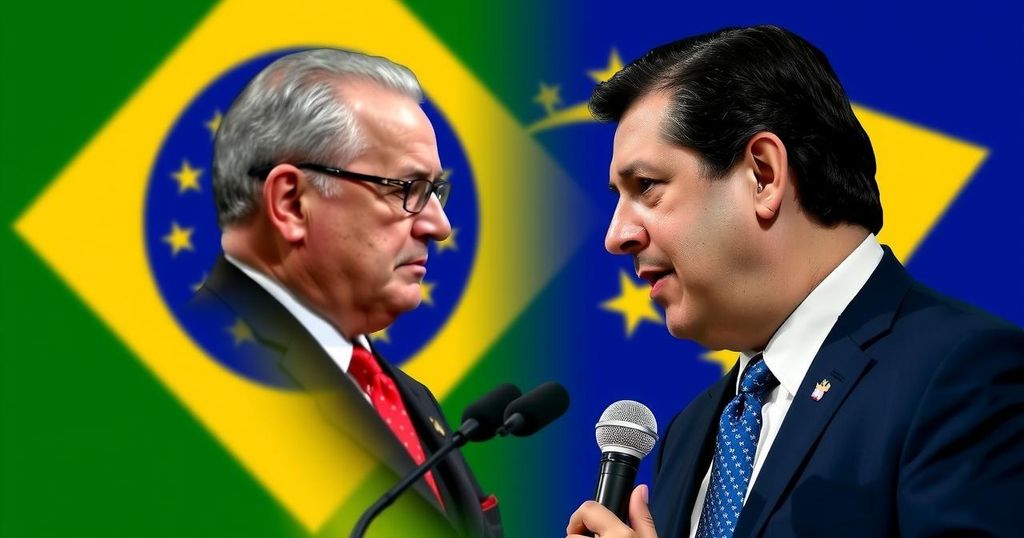Maduro Attributes Venezuela’s BRICS Exclusion to Brazilian Diplomat’s Veto

Nicolás Maduro attributed Venezuela’s exclusion from the BRICS Summit to a veto by a Brazilian diplomat, contradicting prior assurances from Brazil’s foreign minister. This incident exacerbates already strained Venezuela-Brazil relations, linked to legitimacy issues surrounding recent Venezuelan elections, while reflecting Venezuela’s ongoing struggle against U.S. sanctions and its hope for support through BRICS.
Venezuelan President Nicolás Maduro has pointed to a Brazilian diplomat as the cause of his country’s exclusion from the recent BRICS Summit, held in Kazan, Russia. During his weekly television address, Maduro emphasized that Brazil’s Foreign Minister Mauro Viera had previously assured him that Venezuela’s entry into the bloc would not face opposition. Despite these assurances, Maduro claimed that at the summit’s concluding moments, Brazilian diplomat Eduardo Paes Saboia exercised a veto against Venezuela’s inclusion, which Maduro denounced as a personal betrayal. Furthermore, he criticized Brazil’s foreign service, Itamaraty, for its historical ties to U.S. interests, suggesting it has acted contrary to regional solidarity. This diplomatic snub comes amid already strained relations between Venezuela and Brazil, exacerbated by Brazil’s concerns over the questionable legitimacy of Venezuela’s recent presidential elections. Although Brazilian President Luiz Inácio Lula da Silva has attempted to mediate the situation, he has not conclusively affirmed his willingness to engage with Maduro’s government, prompting concerns about future diplomatic interactions. Venezuela’s aspirations for joining BRICS were fueled by hopes that membership could provide a counterbalance to the challenges posed by international sanctions, which have crippled its economy. Maduro has repeatedly called for BRICS to advocate for a new financial system aimed at reducing Western influence over global finance. The new expanded BRICS, which recently accepted 13 partner nations, illustrates the bloc’s growing ambition to reshape international power dynamics.
The BRICS group, composed of Brazil, Russia, India, China, and South Africa, aims to foster a multipolar world through increased cooperation among emerging economies. Venezuela has sought to join this influential coalition in hopes of easing the impact of damaging U.S. sanctions, particularly in the oil sector, which is vital to its economy. Venezuelan leadership perceives an alignment with BRICS as a strategic opportunity to secure alternative sources of finance and diplomatic support against Western hegemony. Maduro’s exclusion from BRICS is viewed as a significant blow, especially since it came after various assurances from Brazilian officials.
President Maduro’s accusations against Brazilian diplomacy highlight a significant setback for Venezuela’s ambition to join BRICS amidst ongoing economic crises exacerbated by international sanctions. The incident illustrates the delicate nature of diplomatic engagements within regional powers and the potential for internal political dynamics to influence international relationships. The implications of this fallout are significant, potentially affecting future collaboration between Venezuela and its South American neighbors, as well as how BRICS navigates its expanding role in global affairs.
Original Source: venezuelanalysis.com







